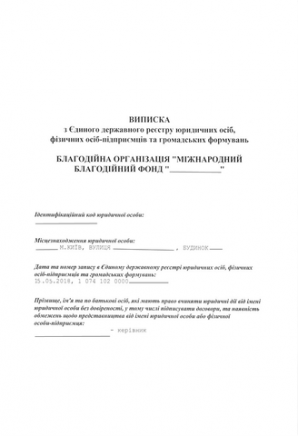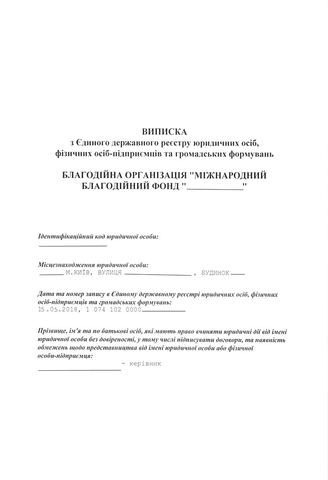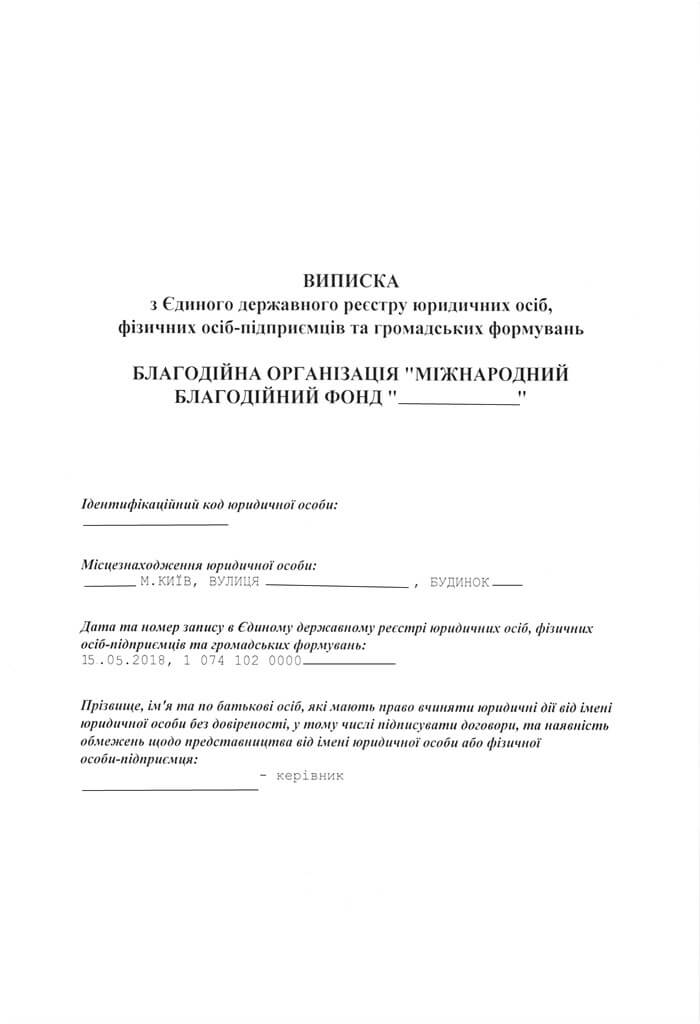Acceptance of humanitarian and charitable aid on the account of a charitable foundation
Cost of services:
Reviews of our Clients
The topic of legal registration of charitable foundations and accounting of donations to them remains in the top legal issues today. Ukraine receives a large amount of humanitarian and charitable assistance. For all this assistance to go to the purposes for which it was raised, it is important not only to import or send everything to Ukraine, but also to register everything in our territory and distribute it for certain needs.
Since the majority of funds and humanitarian assistance comes from abroad and is transferred to people in Ukraine, there are more and more requests from foreign benefactors to provide official documents for organizations which will receive this assistance in Ukraine and will take responsibility for its further distribution.
Therefore, despite the somewhat simplified procedure for receiving a variety of assistance and transferring it, for example, for the Armed Forces of Ukraine or regions suffering from Russian aggression, today charitable foundations are under close scrutiny. It is important that the activities of the foundation be recorded in the appropriate reports, and that the members of the foundation understand the procedure and rules for receiving and applying various types of charitable assistance. Let’s look at some aspects of receiving charitable donations.
If you need practical help, we cover all the needs of organizing work in Ukraine: accounting, legal and personnel support, all types of reporting, hiring, procedures for working with volunteers and migration services. All services in one place, you do not need other contractors. Contact our specialists for advice and development of a basic package of documents for the operation of funds in Ukraine.
You may also like: Charity and Taxes
Ways to obtain funds and assistance for a charitable organization in Ukraine
Charity accounts.
One of the most common ways to collect resources. A separate issue is the purpose of the payment. “For statutory activities” or simply “charitable contribution” is the universal purpose.
Please note! In further distribution of received funds, it is extremely important to adhere to the intended purpose stated in the payment and in the statutory documents of the foundation.
Crypto wallets for charitable assistance.
Yes, this is another way to receive non-cash donations. Today, it’s quite common for assistance to be donated in the form of cryptocurrency. How it works - we talked about it here.
Volunteer boxes.
A common, but already a bit discredited method. To collect donations in boxes, you need to follow certain design rules. In particular, a volunteer must be provided with a notarized power of attorney for collecting such donations, which, among other things, specifies the place/places of collection. It is also desirable to conclude a contract with the volunteer.
Important! Please note that there are a number of cases where a contract with a volunteer is mandatory. We talked about that here.
During martial law, this method is somewhat problematic, and does not bring the desired result.
Humanitarian (material) assistance.
This is now the most common type of charity, as are monetary donations. Although during the war the procedure for accepting and accounting for humanitarian assistance was simplified, certain rules must be observed.
Of course, when people simply bring clothes and food, then no contracts or documents are needed. But when more serious items are handed over, such as vehicles or expensive equipment, it should be properly formalized.
The simplest scheme is a notarial donation agreement and an act of acceptance of the item. Accountants say that the act of receipt of charitable assistance will also be the basis for recording the item in the books.
Open Boxes in Public Places.
This is one type of public collection of charitable donations. Registration of such a box has its own specifics. Firstly, a charitable organization and an institution, where the box will be or on the territory of which it will be placed, should sign a contract about providing a part of the room for the box for collecting charitable donations for a certain purpose. It may be a rental agreement, as well as a loan agreement for a part of the room (territory).
Although it is not normatively established, experts recommend prescribing the following provisions in the agreement:
- description of the place of collection and the box (its characteristics, which are properly secured, sealed, etc.)
- grounds for early termination of this agreement.
Charity machines, charity events like “20% of every cup of coffee goes to charity”.
As in the case of a box in a public place, there must also be a lease or loan agreement for part of the premises or area, but it is even more complicated with the financial component. It is important who is selling these coffees/burgers/chocolates, etc. With such a company, in turn, there must also be an agreement, which specify the amount or percentage of the proceeds from this or that product that will go to the charitable organization’s or a specific beneficiary’s designated account. For example, an orphanage or an animal shelter. And there has to be an agreement with those orphanages and shelters, too.
This is not a complete list of ways to collect charitable donations. The peculiarities of processing and accounting may be different for each specific case.
Our team of lawyers has been working with charitable organizations in Ukraine for over 15 years. Today, we offer the development of a plan of activity for charitable foundations, taking into account all the legal and accounting peculiarities of this activity.
How to record the charitable assistance in the form of material assets, distribute it and transfer it to the place of destination?
As has been repeatedly noted, the Cabinet of Ministers by its Resolution No. 202 of March 5, 2022 simplified the procedure for receiving and accounting for humanitarian assistance. Under martial law, the requirements for receipt, use, accounting and reporting of charitable assistance that were in effect before martial law do not apply.
However, if you want to run business clearly and prevent misunderstandings, please check our previous publication for certain specifics: Import and Distribution of Humanitarian Aid.
In particular, tangible goods must be registered with the State Treasury. Since something abstract and approximate will not be registered, it is necessary to conduct a preliminary assessment of the property. If the benefactor, who gave this property, provided receipts, the question is removed. If the value of the property is difficult to establish, the organization must create a commission to assess the property and draw up a certificate of receipt in kind.
The transfer of humanitarian aid depends on the type of assistance. If it is not military goods, but food or clothes, it is best to do it through the Ministry of Social Policy, because they know the situation, districts where the help is needed most, and places where aid has been already sent. If you need help and interaction with state authorities, our specialists are ready to take it upon themselves.
The cost of registration of a charity foundation in Ukraine
Cost of consultations and legal support of charitable foundations in Ukraine














